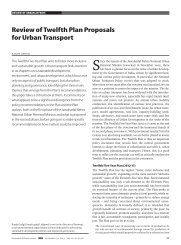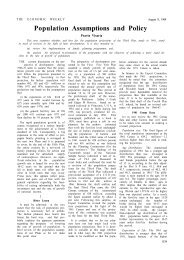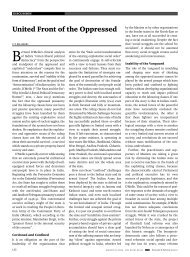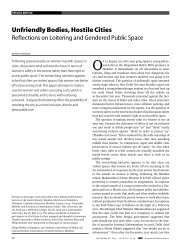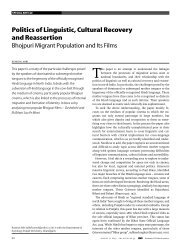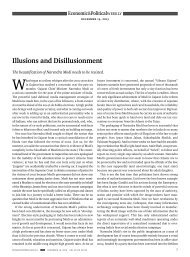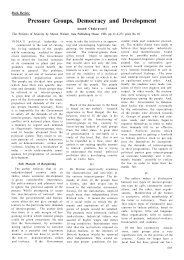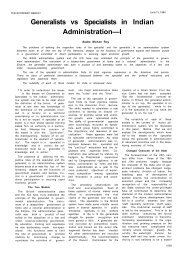Modern India sans the Impact of Capitalism - Economic and Political ...
Modern India sans the Impact of Capitalism - Economic and Political ...
Modern India sans the Impact of Capitalism - Economic and Political ...
You also want an ePaper? Increase the reach of your titles
YUMPU automatically turns print PDFs into web optimized ePapers that Google loves.
<strong>Modern</strong> <strong>India</strong> <strong>sans</strong> <strong>the</strong> <strong>Impact</strong> <strong>of</strong> <strong>Capitalism</strong><br />
Prabhat Patnaik<br />
Perry Anderson is among <strong>the</strong> most<br />
outst<strong>and</strong>ing Marxist thinkers <strong>of</strong><br />
our time. When he writes on<br />
<strong>India</strong>, that is cause for excitement. The<br />
present book, however, based on his<br />
three pieces published earlier in The<br />
London Review <strong>of</strong> Books, makes one feel<br />
short-changed, notwithst<strong>and</strong>ing <strong>the</strong> fact<br />
that it is, as one would expect, lucidly<br />
written <strong>and</strong> eminently readable.<br />
The title, adapted from Marx’s famous<br />
work, refers to a set <strong>of</strong> ideas propagated by<br />
a group <strong>of</strong> distinguished <strong>India</strong>n writers,<br />
notably, Amartya Sen, Meghnad Desai,<br />
Ramach<strong>and</strong>ra Guha, Sunil Khilnani <strong>and</strong><br />
Pratap Bhanu Mehta, which celebrate <strong>the</strong><br />
contemporary realisation <strong>of</strong> <strong>the</strong> “idea <strong>of</strong><br />
<strong>India</strong>”, marked by “four tropes”: “antiquitycontinuity,<br />
diversity-unity, massivity-democracy,<br />
multi- confes sionality-secularity”.<br />
Like a ‘Drain Inspector’s Report’<br />
Against this celebration, Anderson postulates:<br />
first, that <strong>India</strong> being a nation<br />
united since antiquity is a myth; second,<br />
that <strong>the</strong> Congress Party which led <strong>the</strong><br />
struggle for freedom from colonialism,<br />
even though it imagined itself as representative<br />
<strong>of</strong> <strong>the</strong> nation as a whole, was<br />
essentially a Hindu outfit, only 3% <strong>of</strong><br />
whose members at best were Muslims,<br />
<strong>and</strong> whose leaders like G<strong>and</strong>hi <strong>and</strong> Nehru<br />
continued to remain, in varying degrees,<br />
trapped within <strong>the</strong> constraints <strong>of</strong> a Hindu<br />
mindset; third, that this assimilation<br />
<strong>of</strong> <strong>the</strong> “nation” into itself by a predominantly<br />
Hindu Congress Party was responsible<br />
not only for its intransigence that<br />
resulted in <strong>the</strong> country’s partition, but<br />
also for <strong>the</strong> armed occupation till date,<br />
at great human cost, <strong>of</strong> Kashmir <strong>and</strong> <strong>the</strong><br />
north-east, which makes <strong>the</strong> claim <strong>of</strong><br />
<strong>the</strong> “unity <strong>of</strong> <strong>the</strong> nation” being based on<br />
a shared feeling <strong>of</strong> oneness, a hollow<br />
one; that <strong>India</strong>n democracy rests upon<br />
a combination <strong>of</strong> repression <strong>and</strong> caste<br />
manipulation; <strong>and</strong> that underlying <strong>the</strong><br />
“secularity” <strong>of</strong> <strong>India</strong> is an abysmal state <strong>of</strong><br />
30<br />
review ARTICLE<br />
The <strong>India</strong>n Ideology by Perry Anderson (Gurgaon:<br />
Three Essays Collective), 2012; pp vi + 184, Rs 350 (PB),<br />
Rs 550 (HB).<br />
continuing impoverishment <strong>of</strong> its largest<br />
religious minority.<br />
The question <strong>of</strong> whe<strong>the</strong>r <strong>the</strong> writers<br />
he is criticising can be legitimately accused<br />
<strong>of</strong> upholding a celebratory “<strong>India</strong>n<br />
ideology” with <strong>the</strong> specific features attributed<br />
to it, or can even be lumped toge<strong>the</strong>r<br />
as constituting one single set, is something<br />
I shall not take up in this review. I<br />
shall focus only on Anderson’s argument<br />
that <strong>the</strong> religious underpinning <strong>of</strong> <strong>the</strong><br />
struggle for independence not only engendered,<br />
in a manner comparable to Israel<br />
<strong>and</strong> Irel<strong>and</strong>, a more rabid representation<br />
<strong>of</strong> itself, in <strong>the</strong> form <strong>of</strong> <strong>the</strong> Hindutva<br />
forces, but also distorted <strong>the</strong> purported<br />
achievements <strong>of</strong> <strong>the</strong> republic that are<br />
usually so cheerfully celebrated, namely,<br />
“unity”, “democracy” <strong>and</strong> “secularity”.<br />
As an antidote to <strong>the</strong> gloating that one<br />
<strong>of</strong>ten comes across about “ours being <strong>the</strong><br />
largest democracy”, <strong>and</strong> as an account <strong>of</strong><br />
<strong>the</strong> horrendous repression upon which<br />
this “democracy” rests (in which <strong>the</strong><br />
massacre <strong>of</strong> 40,000 innocent people by<br />
<strong>the</strong> <strong>India</strong>n army when it marched into<br />
Hyderabad is one <strong>of</strong> <strong>the</strong> lesser-known<br />
episodes), this book is certainly valuable.<br />
Its relentless exposures, some may feel,<br />
make it read like a “drain inspector’s report”,<br />
to borrow G<strong>and</strong>hi’s phrase; but if<br />
<strong>the</strong> drain happens to be running through<br />
<strong>the</strong> house, <strong>and</strong> is wide <strong>and</strong> full <strong>of</strong> putrid<br />
matter, <strong>the</strong>n <strong>the</strong> drain inspector’s report<br />
becomes a must-read for all. Indeed in<br />
some respects things are even worse<br />
than Anderson presents: in several parts<br />
<strong>of</strong> <strong>India</strong> at present, most notably UP,<br />
large numbers <strong>of</strong> innocent young Muslim<br />
men are arrested <strong>and</strong> kept in jail for<br />
years without trial, under <strong>the</strong> Unlawful<br />
Activities (Prevention) Act; <strong>and</strong> lawyers<br />
are threatened, even beaten up, if <strong>the</strong>y<br />
dare to defend such persons who are<br />
br<strong>and</strong>ed as “terrorists” because <strong>of</strong> <strong>the</strong><br />
mere fact <strong>of</strong> <strong>the</strong>ir arrest.<br />
The problem arises however with<br />
Anderson’s argument. Let us accept his<br />
argument <strong>and</strong> ask <strong>the</strong> question: where<br />
does <strong>India</strong> go from here? Since “<strong>the</strong> poor<br />
remain divided among <strong>the</strong>mselves” (because<br />
<strong>of</strong> <strong>the</strong> caste system), <strong>the</strong> “workers<br />
are scattered <strong>and</strong> ill-organised” (making<br />
<strong>the</strong> Left ineffective), <strong>and</strong> <strong>the</strong> intelligentsia,<br />
notwithst<strong>and</strong>ing its quality <strong>and</strong><br />
excellence, remains trapped within <strong>the</strong><br />
celebratory “idea <strong>of</strong> <strong>India</strong>”, Anderson<br />
effectively sees no prospects <strong>of</strong> transcendence<br />
<strong>of</strong> <strong>the</strong> current <strong>India</strong>n situation.<br />
He ends his book by suggesting that<br />
<strong>the</strong> exit <strong>of</strong> <strong>the</strong> Congress from <strong>the</strong> “scene<br />
would be <strong>the</strong> best single gift <strong>India</strong>n democracy<br />
could give itself”, but, no matter<br />
whe<strong>the</strong>r one agrees with him on <strong>the</strong><br />
consequences <strong>of</strong> such an exit, this is not<br />
something that can simply be wished<br />
into being. The continuing existence <strong>of</strong><br />
<strong>the</strong> Congress Party after all is socially<br />
conditioned, whence it must follow according<br />
to him that <strong>India</strong> has no future<br />
that is any different from its recent past.<br />
Hegel, basing himself on a colonial<br />
document <strong>of</strong> 1812 that talked <strong>of</strong> <strong>the</strong> unchanging<br />
“village communities”, had<br />
famously said that <strong>India</strong> had no history,<br />
only a change <strong>of</strong> dynasties. 1 Anderson’s<br />
book says in effect that <strong>India</strong> will have<br />
no history, only a change <strong>of</strong> governments<br />
in a repressive parliamentary democracy<br />
that is simultaneously sustained <strong>and</strong><br />
“debauched” by <strong>the</strong> caste system.<br />
Marx, while holding a similar view as<br />
Hegel’s regarding <strong>India</strong>’s precolonial<br />
past, had seen in colonialism a revolutionary<br />
agent <strong>of</strong> change. This was not<br />
just an empirical observation, but based<br />
on <strong>the</strong> <strong>the</strong>oretical position that once a<br />
society, no matter what its past, got<br />
drawn into <strong>the</strong> orbit <strong>of</strong> capitalism, it<br />
could no longer remain changeless. We<br />
SEPTEMBER 7, 2013 vol xlviii no 36 EPW <strong>Economic</strong> & <strong>Political</strong> Weekly
cannot in o<strong>the</strong>r words talk <strong>of</strong> <strong>India</strong>’s<br />
future, <strong>and</strong> colonial <strong>and</strong> postcolonial past,<br />
without reference to its relationship with<br />
capitalism. And to me <strong>the</strong> greatest problem<br />
with Anderson’s book is that capitalism<br />
does not figure in it. Trapped within a<br />
paradigm where Hinduism is elevated to<br />
<strong>the</strong> role <strong>of</strong> an explanatory factor, without<br />
any reference to <strong>the</strong> capitalist system<br />
that is characterised by an immanent<br />
logic <strong>of</strong> its own to which <strong>India</strong> is inextricably<br />
tied, Anderson, not surprisingly,<br />
sees no dynamics in its evolution. He examines<br />
nei<strong>the</strong>r how capitalism impinges<br />
on this society, nor how Hinduism itself<br />
changes through <strong>the</strong> impact <strong>of</strong> capitalism.<br />
Once we bring capitalism into <strong>the</strong><br />
picture, <strong>the</strong> narrative will change; <strong>and</strong><br />
what is more, many things attributed by<br />
Anderson to <strong>the</strong> influence <strong>of</strong> Hinduism<br />
will appear to be explicable o<strong>the</strong>rwise.<br />
Anti-Imperialist Nationalism<br />
The ignoring <strong>of</strong> <strong>the</strong> impact <strong>of</strong> capitalism<br />
vitiates his analysis <strong>of</strong> <strong>the</strong> anti-colonial<br />
struggle itself. In my village primary<br />
school in <strong>the</strong> 1950s we were taught that<br />
independence, <strong>and</strong> all <strong>the</strong> benefits it<br />
brought, came to <strong>India</strong> because <strong>of</strong> <strong>the</strong><br />
sagacity <strong>of</strong> <strong>the</strong> leaders. Anderson’s analysis<br />
seems to me a mirror image <strong>of</strong> it:<br />
Independence <strong>and</strong> all <strong>the</strong> sufferings that<br />
accompanied it, <strong>and</strong> <strong>the</strong> travails that<br />
have subsequently ensued, came to<br />
<strong>India</strong> because <strong>of</strong> <strong>the</strong> limitations <strong>of</strong> <strong>the</strong><br />
leaders, <strong>the</strong>ir Hindu outlook <strong>and</strong> <strong>the</strong><br />
conceit embodied in it that it represented<br />
<strong>the</strong> “nation”. The people, what made<br />
<strong>the</strong>m act, <strong>the</strong> circumstances in which<br />
<strong>the</strong>y acted, do not figure in ei<strong>the</strong>r <strong>of</strong><br />
<strong>the</strong>se narratives.<br />
Peasant societies typically look up to<br />
leaders with a streak <strong>of</strong> renunciation.<br />
This has nothing to do with Hinduism.<br />
The renunciatory streak one finds in<br />
G<strong>and</strong>hi for instance, enmeshed no doubt<br />
in his own personal philosophy into<br />
which Hinduism was an input, is paralleled<br />
by what one finds in Ho Chi Minh<br />
or Muzaffar Ahmed or P Sundarayya.<br />
But <strong>the</strong> credibility <strong>of</strong> a leader associated<br />
with a renunciatory streak is not enough<br />
in itself to mobilise <strong>the</strong> peasantry. It is<br />
a necessary not a sufficient condition,<br />
for which <strong>the</strong> material conditions must<br />
in addition be conducive. The specific<br />
additional factor that roused <strong>the</strong> peasantry<br />
in <strong>India</strong> <strong>and</strong> made it swell <strong>the</strong><br />
ranks <strong>of</strong> <strong>the</strong> anti-colonial struggle was<br />
<strong>the</strong> impact <strong>of</strong> <strong>the</strong> Great Depression. (The<br />
agricultural crisis that was a principal<br />
component <strong>of</strong> it began, it must be remembered,<br />
in 1926 itself.)<br />
To make this mobilisation possible,<br />
<strong>the</strong> Congress placed before <strong>the</strong> people<br />
a blueprint <strong>of</strong> what <strong>the</strong> future <strong>India</strong><br />
would look like, through a resolution<br />
adopted at its Karachi session in 1931,<br />
which envisaged inter alia universal<br />
adult franchise; a minimum st<strong>and</strong>ard <strong>of</strong><br />
living for every <strong>India</strong>n; free <strong>and</strong> compulsory<br />
primary education; equality<br />
before <strong>the</strong> law irrespective <strong>of</strong> caste, religion<br />
or gender; <strong>and</strong> a separation <strong>of</strong> religion<br />
from <strong>the</strong> State. Women’s suffrage,<br />
it may be recalled, had come to Britain<br />
in 1928; <strong>the</strong> fact that within three years<br />
<strong>of</strong> it, universal adult suffrage was<br />
sought to be introduced in <strong>India</strong> is not<br />
to be belittled. True, as Anderson points<br />
out, Ceylon too introduced universal<br />
adult suffrage in 1931; but <strong>the</strong> idea <strong>of</strong><br />
universal adult suffrage in a society<br />
characterised by “untouchability” <strong>and</strong><br />
even “unseeability” (as in Kerala) was<br />
astoundingly revolutionary. I have seen<br />
with my own eyes <strong>the</strong> intense anger among<br />
<strong>the</strong> powerful upper caste l<strong>and</strong>lords in my<br />
village when <strong>the</strong> dalits exercised <strong>the</strong>ir<br />
franchise in <strong>the</strong> 1952 general elections.<br />
The Karachi resolution (which had even<br />
advocated abolition <strong>of</strong> <strong>the</strong> death penalty)<br />
did not, paradoxically, have “l<strong>and</strong> redistribution”<br />
on its agenda, but this was<br />
rectified to an extent during <strong>the</strong> Congress<br />
Party’s campaign for <strong>the</strong> 1937 elections.<br />
The Karachi resolution, however, does<br />
not figure in Anderson’s account <strong>of</strong> <strong>the</strong><br />
freedom struggle.<br />
The peasantry in <strong>the</strong> 1930s wanted<br />
above all its economic dem<strong>and</strong>s to be<br />
met, which is why in Punjab it was not<br />
<strong>the</strong> Muslim League but <strong>the</strong> Unionist Party<br />
<strong>of</strong> Sik<strong>and</strong>ar Hayat Khan, Fazli Husain<br />
<strong>and</strong> Chhotu Ram that won <strong>the</strong> elections.<br />
Chhotu Ram, as revenue minister, brought<br />
in legislation to provide debt relief to<br />
<strong>the</strong> peasantry <strong>and</strong> is remembered to this<br />
day by <strong>the</strong> Jat peasantry <strong>of</strong> <strong>the</strong> region.<br />
(I have seen his statues dotting almost<br />
every m<strong>of</strong>ussil town I have visited in <strong>the</strong><br />
region <strong>of</strong> <strong>the</strong> erstwhile Punjab which<br />
REVIEW ARTICLE<br />
came to <strong>India</strong>.) The appeal <strong>of</strong> <strong>the</strong> Congress<br />
in short can scarcely be said<br />
to have been based on religion, since<br />
<strong>the</strong> appeal <strong>of</strong> religion itself was ra<strong>the</strong>r<br />
limited prior to <strong>the</strong> communalisation<br />
that came later. (Indeed, <strong>the</strong> Unionist<br />
Party which prided itself upon being<br />
multi-religious, would not have got<br />
elected in Muslim-majority Punjab if<br />
religion was <strong>the</strong> deciding factor.)<br />
The Congress did, in short, try to provide<br />
a charter <strong>of</strong> citizenship transcending<br />
religion <strong>and</strong> caste, <strong>and</strong> had some justification<br />
in claiming that it was speaking<br />
for <strong>the</strong> “nation” as a whole. This<br />
claim cannot simply be brushed aside as<br />
<strong>the</strong> mere pretension <strong>of</strong> a Hindu elite that<br />
dominated <strong>the</strong> Congress. (The latter<br />
could no doubt have been a subsidiary<br />
factor, but that is not pertinent).<br />
Of course, when Independence came,<br />
not all <strong>the</strong> pledges <strong>of</strong> Karachi were<br />
redeemed. In particular, while some <strong>of</strong><br />
<strong>the</strong> political elements <strong>of</strong> <strong>the</strong> Karachi resolution<br />
were implemented, no matter<br />
how imperfectly, <strong>the</strong> socio-economic<br />
elements were not, a possibility anticipated<br />
by Ambedkar in his closing remarks<br />
to <strong>the</strong> Constituent Assembly, remarks<br />
that Anderson finds fault with. But <strong>the</strong><br />
reneging on <strong>the</strong> socio-economic elements<br />
<strong>of</strong> <strong>the</strong> Karachi Resolution was not<br />
because <strong>the</strong> Congress was trapped within<br />
Hinduism but because it was committed<br />
to capitalism.<br />
The capitalism it developed after<br />
independence however was itself sui<br />
generis. It was a national capitalism,<br />
developed in relative autonomy from<br />
imperialism, by using <strong>the</strong> public sector as<br />
a bulwark against metropolitan capital,<br />
<strong>and</strong> <strong>the</strong> State (with <strong>the</strong> assistance <strong>of</strong> <strong>the</strong><br />
Soviet Union) as an active promoter <strong>of</strong><br />
<strong>the</strong> project. It was, in short, a capitalism<br />
sought to be developed on <strong>the</strong> soil <strong>of</strong> <strong>the</strong><br />
anti-colonial national movement, by<br />
carrying over <strong>the</strong> anti-colonial legacy<br />
<strong>of</strong> <strong>the</strong> movement, to a policy <strong>of</strong> nonalignment,<br />
<strong>and</strong> <strong>of</strong> escape from <strong>the</strong><br />
economic embrace <strong>of</strong> post-war imperialism<br />
dominated by <strong>the</strong> US. <strong>India</strong> was<br />
not <strong>the</strong> only country where this was<br />
tried; on <strong>the</strong> contrary, virtually <strong>the</strong><br />
entire third world adopted such a<br />
regime which Michal Kalecki (1972) has<br />
called an “Intermediate Regime”, an apt<br />
<strong>Economic</strong> & <strong>Political</strong> Weekly EPW SEPTEMBER 7, 2013 vol xlviii no 36 31
REVIEW ARTICLE<br />
description, though somewhat misleading,<br />
at least in <strong>the</strong> case <strong>of</strong> <strong>India</strong>, in its connotation<br />
with regard to <strong>the</strong> class nature<br />
<strong>of</strong> <strong>the</strong> State (which Kalecki himself<br />
cautiously admits).<br />
To underst<strong>and</strong> this trajectory one<br />
must note that, even leaving aside <strong>the</strong><br />
Muslim League, <strong>the</strong>re were two quite<br />
distinct str<strong>and</strong>s <strong>of</strong> “nationalism” in pre-<br />
Independence <strong>India</strong>. One was an anticolonial<br />
overarching nationalism that<br />
sought to mobilise people on <strong>the</strong> basis <strong>of</strong><br />
a charter <strong>of</strong> dem<strong>and</strong>s which treated<br />
<strong>the</strong>m as citizens; <strong>the</strong> o<strong>the</strong>r was a specifically<br />
Hindu nationalism, that was not so<br />
much anti-colonial as anti-Muslim <strong>and</strong><br />
that aimed to establish a Hindu Rashtra<br />
without any clear agenda <strong>of</strong> what it<br />
would mean even for <strong>the</strong> Hindu citizens<br />
<strong>of</strong> this future Rashtra. (I am loath to use<br />
<strong>the</strong> word “nationalism” for <strong>the</strong> latter, but<br />
do so only for convenience, out <strong>of</strong> deference<br />
to existing usage.) No matter how<br />
Hindu <strong>and</strong> upper caste <strong>the</strong> individual<br />
leaders <strong>of</strong> <strong>the</strong> Congress might have been,<br />
no matter what rituals <strong>the</strong>y practised in<br />
<strong>the</strong>ir homes or even at <strong>of</strong>ficial venues,<br />
<strong>the</strong> Congress on <strong>the</strong> whole stood for <strong>the</strong><br />
first kind <strong>of</strong> nationalism; <strong>the</strong> Rashtriya<br />
Swayamsevak Sangh <strong>and</strong> o<strong>the</strong>rs for<br />
<strong>the</strong> second.<br />
This has an important implication.<br />
The nature <strong>of</strong> a movement is not assessed<br />
by merely aggregating a set <strong>of</strong> empirical<br />
beliefs that its leading participants<br />
may happen to hold at a certain<br />
point <strong>of</strong> time. On <strong>the</strong> contrary, <strong>the</strong>se empirical<br />
beliefs, apart from being shaped<br />
<strong>and</strong> modified, are also overlaid by <strong>the</strong><br />
purpose for which <strong>the</strong> movement st<strong>and</strong>s.<br />
The leading participants <strong>of</strong> any living<br />
movement, in o<strong>the</strong>r words, rise above<br />
<strong>the</strong>ir empirical selves in constituting <strong>the</strong><br />
movement, whence it follows that major<br />
events in <strong>the</strong> course <strong>of</strong> <strong>the</strong> movement,<br />
such as <strong>the</strong> Poona Pact or <strong>the</strong> Partition<br />
<strong>of</strong> <strong>the</strong> country, cannot just be explained<br />
in terms <strong>of</strong> <strong>the</strong>se empirical beliefs <strong>of</strong><br />
<strong>the</strong> leaders, having to do with <strong>the</strong>ir<br />
Hindu mindset.<br />
The point here is not to endorse <strong>the</strong><br />
Poona Pact or to absolve <strong>the</strong> Congress<br />
leadership from responsibility for <strong>the</strong><br />
Partition, but to suggest that in examining<br />
<strong>the</strong> motives behind <strong>the</strong>se decisions, explanations<br />
that spring from <strong>the</strong> overall<br />
nature <strong>of</strong> <strong>the</strong> movement must have precedence<br />
if <strong>the</strong>y exist. And in <strong>the</strong> present<br />
case <strong>the</strong>y evidently do (such as, for instance,<br />
<strong>the</strong> view that <strong>the</strong> Congress leadership’s<br />
objection to “identitarian” politics<br />
or “balkanisation” sprang from <strong>the</strong><br />
perception that it amounted to a violation<br />
<strong>of</strong> anti-imperialist nationalism). 2<br />
At any rate, <strong>the</strong> general point remains:<br />
notwithst<strong>and</strong>ing every single remark <strong>of</strong><br />
G<strong>and</strong>hi <strong>and</strong> Nehru that Anderson quotes,<br />
showing <strong>the</strong>m to be trapped within a<br />
Hindu mindset, <strong>the</strong>y remained committed<br />
to <strong>the</strong> first kind <strong>of</strong> nationalism, i e, an<br />
overarching anti-imperialist nationalism.<br />
And it is this which made it so difficult<br />
for <strong>the</strong> Left to establish its centrality in<br />
<strong>the</strong> anti-colonial struggle.<br />
The fact that <strong>the</strong> Congress leadership<br />
under G<strong>and</strong>hi deliberately prevented <strong>the</strong><br />
anti-colonial struggle from becoming so<br />
militant that <strong>the</strong> central influence in it<br />
could pass on to more radical elements is<br />
underscored by Anderson while discussing<br />
G<strong>and</strong>hi’s withdrawal <strong>of</strong> <strong>the</strong> noncooperation<br />
movement after Chauri<br />
Chaura. This has been <strong>the</strong> st<strong>and</strong>ard<br />
underst<strong>and</strong>ing <strong>of</strong> <strong>the</strong> Left, <strong>the</strong> stuff, as it<br />
Insights into <strong>the</strong> academic revolution<br />
<strong>and</strong> education reform!<br />
PPP PARADOX<br />
Promise <strong>and</strong> Perils <strong>of</strong> Public-Private<br />
Partnership in Education<br />
Pritha Goalan<br />
Public–private partnerships have been in use for a<br />
long time, <strong>and</strong> in many countries, to build roads <strong>and</strong><br />
bridges, clean rivers, <strong>and</strong> manage waste. In <strong>the</strong> last<br />
two decades, <strong>the</strong>y have slowly begun to make <strong>the</strong>ir<br />
presence felt in <strong>the</strong> eld <strong>of</strong> public education. everal<br />
countries, including <strong>the</strong> United tates <strong>and</strong> <strong>India</strong>, have<br />
recently enacted laws that include partnerships with<br />
private entities as a vehicle for education reform.<br />
PPP Paradox discusses a swa<strong>the</strong> <strong>of</strong> PPPs in education <strong>and</strong> assesses <strong>the</strong>ir<br />
approach <strong>and</strong> contribution to genuine school change. This broad <strong>and</strong> evenh<strong>and</strong>ed<br />
survey <strong>of</strong> a variety <strong>of</strong> policy positions is followed by specic accounts<br />
<strong>of</strong> reform efforts in two case studies—one from a partnership in middle-school<br />
change in curriculum <strong>and</strong> instruction that took place in <strong>the</strong> state <strong>of</strong> Michigan<br />
in <strong>the</strong> United tates, <strong>and</strong> <strong>the</strong> o<strong>the</strong>r from a partnership to bring Montessori<br />
education to government-run schools in Chennai, a large <strong>India</strong>n city.<br />
2013 1 aes ardack ` 00 13211123<br />
UNIVERSITIES FOR A<br />
NEW WORLD<br />
Making a Global Network in International<br />
Higher Education, 1913-2013<br />
Edited by Deryck M Schreuder<br />
Universities for a New World takes <strong>the</strong> centenary <strong>of</strong><br />
<strong>the</strong> Association <strong>of</strong> Commonwealth Universities in 2013<br />
as a point <strong>of</strong> departure to explore what <strong>the</strong> Organisation<br />
for <strong>Economic</strong> Co-operation <strong>and</strong> Development (OECD)<br />
has evocatively termed <strong>the</strong> international ‘Academic<br />
Revolution’ in modern higher education.<br />
The book features critical <strong>and</strong> interrelated essays on that protean global ‘revolution’<br />
in higher education provision—<strong>the</strong> gains as well as <strong>the</strong> losses. Transformation<br />
may have been inevitable, but progress towards greater participation rates has<br />
not always been followed with quality service to students or <strong>the</strong> society at large.<br />
Measuring those changes to universities since 1913 is inherently difcult as<br />
<strong>the</strong>y are also still proceeding apace. The book accordingly also <strong>of</strong>fers informed<br />
perspectives on <strong>the</strong> complex future(s) <strong>of</strong> universities in <strong>the</strong> 21st century—in<br />
which, paradoxically, fur<strong>the</strong>r change is likely to be <strong>the</strong> only constant.<br />
2013 aes ardack ` 000 13211333<br />
Order now <strong>and</strong> GET 20% OFF! To avail discount write to marketing@sagepub.in with code EPWSEP0113!<br />
wwwsaeuin Los Angeles • London • New Delhi • ingapore • Washington DC<br />
32<br />
SEPTEMBER 7, 2013 vol xlviii no 36 EPW <strong>Economic</strong> & <strong>Political</strong> Weekly
were, <strong>of</strong> Party classes. I have myself heard<br />
B T Ranadive expound it on several occasions.<br />
But this way <strong>of</strong> insulating <strong>the</strong><br />
anti-colonial struggle from <strong>the</strong> influence<br />
<strong>of</strong> more radical elements would not have<br />
worked if <strong>the</strong> Congress leadership itself<br />
had been suspect on its anti-colonialism,<br />
if it had not been a votary <strong>of</strong> <strong>the</strong> first<br />
kind <strong>of</strong> nationalism that transcended <strong>the</strong><br />
confines <strong>of</strong> its own upper caste Hinduness,<br />
within which Anderson accuses<br />
it <strong>of</strong> being trapped. B T Ranadive was<br />
recognising precisely this when he said<br />
that one <strong>of</strong> <strong>the</strong> reasons for <strong>the</strong> lack <strong>of</strong><br />
success <strong>of</strong> <strong>the</strong> communists in <strong>India</strong> was<br />
that <strong>the</strong>y had to contend with leaders<br />
like G<strong>and</strong>hi <strong>and</strong> Nehru, who, by inference,<br />
were not merely <strong>the</strong> narrow<br />
personalities that Anderson portrays<br />
<strong>the</strong>m to be. 3 (B T Ranadive also thought<br />
that <strong>the</strong> achievement <strong>of</strong> <strong>the</strong> <strong>India</strong>n<br />
communists lay in <strong>the</strong> fact that despite<br />
having to confront leaders like G<strong>and</strong>hi<br />
<strong>and</strong> Nehru, <strong>the</strong>y held <strong>the</strong>ir ground <strong>and</strong><br />
emerged as a significant, even though<br />
not central, force.) 4<br />
Sharp Discontinuities<br />
The basic difference between <strong>the</strong>n <strong>and</strong><br />
now is that <strong>the</strong> Congress Party has now<br />
ab<strong>and</strong>oned all allegiance to an antiimperialist<br />
nationalism. It has done so<br />
not because <strong>of</strong> its Hindu mindset but because<br />
<strong>of</strong> <strong>the</strong> nature <strong>of</strong> evolution <strong>of</strong> world<br />
capitalism that has led to <strong>the</strong> globalisation<br />
<strong>of</strong> capital, especially <strong>of</strong> finance. This<br />
has brought in its train a number <strong>of</strong><br />
developments: <strong>the</strong> unviability from <strong>the</strong><br />
point <strong>of</strong> view <strong>of</strong> <strong>the</strong> <strong>India</strong>n bourgeoisie<br />
<strong>of</strong> <strong>the</strong> earlier trajectory <strong>of</strong> capitalist development,<br />
within a dirigiste regime, in<br />
relative autonomy from imperialism; 5 its<br />
consequent progressive integration with<br />
globalised capital <strong>and</strong>, towards this end,<br />
<strong>the</strong> adoption <strong>of</strong> a neo-liberal regime; a<br />
change in <strong>the</strong> nature <strong>of</strong> <strong>the</strong> State, paralleling<br />
this change in economic regime,<br />
which has entailed its closer enmeshing<br />
with big capital <strong>and</strong> international fin ance,<br />
<strong>and</strong> its withdrawal <strong>of</strong> support <strong>and</strong> protection<br />
from petty producers <strong>and</strong> <strong>the</strong><br />
peasantry; <strong>the</strong> precipitation, as a result,<br />
<strong>of</strong> a crisis in petty production, in particular<br />
an agrarian crisis that has led to<br />
large-scale peasant suicides (which curiously<br />
do not find a mention in Anderson);<br />
<strong>the</strong> unleashing with much greater fury<br />
than before <strong>of</strong> a process <strong>of</strong> primitive accumulation<br />
<strong>of</strong> capital; a vast increase in<br />
inequalities in income <strong>and</strong> wealth; <strong>and</strong>,<br />
during <strong>the</strong> years <strong>of</strong> bubble-sustained<br />
boom in metropolitan capitalism, a high<br />
growth rate in <strong>the</strong> <strong>India</strong>n economy that<br />
has brought palpable economic benefits<br />
to wide sections <strong>of</strong> <strong>the</strong> urban middle<br />
class who have <strong>the</strong>reby become votaries<br />
<strong>of</strong> neo-liberalism (a situation that, in<br />
consequence <strong>of</strong> <strong>the</strong> world capitalist<br />
crisis, is already changing in economic<br />
terms <strong>and</strong> is likely to change in political<br />
terms as well).<br />
Thus instead <strong>of</strong> <strong>the</strong> continuity flowing<br />
from <strong>the</strong> Hindu character <strong>of</strong> <strong>the</strong> Congress<br />
leadership <strong>of</strong> <strong>the</strong> national movement,<br />
which is what Anderson suggests, we<br />
actually have sharp discontinuities flowing<br />
from <strong>the</strong> changing nature <strong>of</strong> world<br />
capitalism, which also portend not a<br />
future like <strong>the</strong> past, but major changes<br />
in <strong>India</strong> as well. The growth <strong>of</strong> communalism<br />
<strong>the</strong>n has to be located not as <strong>the</strong><br />
inevitable fur<strong>the</strong>r development <strong>of</strong> <strong>the</strong><br />
Hinduism already latent in <strong>the</strong> freedom<br />
struggle, but in <strong>the</strong> weakening <strong>of</strong> <strong>the</strong><br />
overarching anti-imperialist nationalism,<br />
<strong>the</strong> “Karachi tendency”, that provided such<br />
a strong counterpoint to Hindu communalism<br />
all <strong>the</strong>se years. (This weakening<br />
had already occurred before <strong>the</strong> 1991<br />
“reforms” were introduced, <strong>and</strong> provided<br />
<strong>the</strong> setting for <strong>the</strong>ir introduction.)<br />
Of course <strong>the</strong>re have been o<strong>the</strong>r contributing<br />
factors: <strong>the</strong> Islamophobia in<br />
<strong>the</strong> metropolitan countries, especially in<br />
<strong>the</strong> US, to which <strong>the</strong> newly-flourishing<br />
middle class looks up; <strong>the</strong> fact that this<br />
middle class is unmoved by any antiimperialism<br />
(it is on <strong>the</strong> contrary enamoured<br />
<strong>of</strong> capitalist globalisation); <strong>and</strong><br />
<strong>the</strong> fact that, being predominantly<br />
Hindu, it combines <strong>the</strong> traditional upper<br />
caste Hindu contempt for <strong>the</strong> lower<br />
castes, including <strong>the</strong> Muslims, with <strong>the</strong><br />
contempt <strong>of</strong> <strong>the</strong> nouveau riche for <strong>the</strong><br />
poor that one typically encounters under<br />
capitalism. All <strong>the</strong>se however have to be<br />
seen as part <strong>of</strong> <strong>the</strong> new development,<br />
following from <strong>the</strong> changing nature <strong>of</strong><br />
world capitalism, <strong>and</strong> not as a mere fallout<br />
<strong>of</strong> <strong>the</strong> earlier national movement.<br />
With <strong>the</strong> Congress ab<strong>and</strong>oning antiimperialist<br />
nationalism, <strong>and</strong> <strong>the</strong> BJP<br />
REVIEW ARTICLE<br />
ab<strong>and</strong>oning for tactical reasons after<br />
an initial thrust (when it even set up a<br />
commission to amend <strong>the</strong> Constitution)<br />
any overt moves towards a Hindu Rashtra,<br />
<strong>the</strong> difference between <strong>the</strong> two parties<br />
has narrowed; <strong>and</strong> neo-liberalism is where<br />
<strong>the</strong>y all converge. (Modi’s emergence as<br />
potential prime minister may be adduced<br />
as being contrary to such a reading; but<br />
it signifies less an aggressive move<br />
towards Hindu Rashtra, <strong>and</strong> more an attempt<br />
at direct corporate control over<br />
<strong>the</strong> State.)<br />
This discontinuity between <strong>the</strong>n <strong>and</strong><br />
now, arising from <strong>the</strong> changing nature<br />
<strong>of</strong> world capitalism, permeates every<br />
phenomenon. Even <strong>the</strong> coercion deplo yed<br />
against people in particular regions in<br />
<strong>India</strong> has to be broken up into different<br />
constituents. The insistence through<br />
armed intervention upon <strong>the</strong> territorial<br />
integrity <strong>of</strong> an <strong>India</strong> inherited from<br />
<strong>the</strong> “colonial masters” has, contrary to<br />
what Anderson suggests, little to do<br />
with Hinduism. Third world nationalism<br />
everywhere has been highly “territorial”.<br />
This is so in China whose treatment <strong>of</strong><br />
Tibet <strong>and</strong> Xinjiang is symptomatic <strong>of</strong> this<br />
“territoriality”, in Vietnam which even<br />
fought a war with China arising from a<br />
terri torial dispute, <strong>and</strong> in Indonesia<br />
which made it a point to occupy West<br />
Irian <strong>and</strong> also had a conflict with Malaysia<br />
(though in <strong>the</strong> latter case, because <strong>of</strong><br />
<strong>the</strong> presence <strong>of</strong> British imperialism, establishing<br />
“territoriality” as <strong>the</strong> cause <strong>of</strong><br />
<strong>the</strong> dispute becomes difficult). <strong>India</strong><br />
falls into this pattern, <strong>and</strong> <strong>the</strong> Hinduism<br />
<strong>of</strong> its leadership during <strong>the</strong> freedom<br />
struggle is not germane to <strong>the</strong> issue as<br />
an explanatory factor.<br />
But over <strong>and</strong> above this form <strong>of</strong> “territoriality”,<br />
<strong>the</strong>re is an additional recent<br />
factor, namely, <strong>the</strong> encroachment on <strong>the</strong><br />
l<strong>and</strong>s <strong>and</strong> habitats <strong>of</strong> <strong>the</strong> tribal population<br />
<strong>of</strong> central <strong>India</strong> which is a fallout<br />
<strong>of</strong> neo-liberalism, <strong>of</strong> <strong>the</strong> neo-liberal<br />
<strong>India</strong>n state’s determination to open up<br />
<strong>the</strong> area, rich in minerals, for corporate<br />
capital, both <strong>India</strong>n <strong>and</strong> foreign. To<br />
lump <strong>the</strong>se different instances <strong>of</strong> aggr<strong>and</strong>isement<br />
as <strong>the</strong> consequence <strong>of</strong><br />
upper caste Hindu domination over <strong>the</strong><br />
national movement, with no reference<br />
ei<strong>the</strong>r to <strong>the</strong> “territoriality” <strong>of</strong> all third<br />
world nationalisms or to <strong>the</strong> nature <strong>of</strong><br />
<strong>Economic</strong> & <strong>Political</strong> Weekly EPW SEPTEMBER 7, 2013 vol xlviii no 36 33
REVIEW ARTICLE<br />
contemporary capitalism, does not<br />
st<strong>and</strong> scrutiny.<br />
One particular aspect <strong>of</strong> this discontinuity<br />
is <strong>of</strong>ten glossed over. Official<br />
spokespersons in <strong>India</strong> justify neo-liberalism<br />
with <strong>the</strong> argument that <strong>the</strong> high<br />
growth rate it has produced has brought<br />
down <strong>the</strong> extent <strong>of</strong> poverty. Many who<br />
do not accept this argue none<strong>the</strong>less<br />
that capitalist development being capitalist<br />
development, it matters little<br />
whe<strong>the</strong>r it is <strong>of</strong> <strong>the</strong> “dirigiste” or <strong>the</strong><br />
“neo-liberal” variety. Nei<strong>the</strong>r <strong>of</strong> <strong>the</strong>se arguments<br />
however is valid. The most basic<br />
<strong>and</strong> reliable index <strong>of</strong> well-being, far<br />
more reliable than what <strong>the</strong> deflation <strong>of</strong><br />
consumption expenditure by some price<br />
index can ever give, is <strong>the</strong> amount <strong>of</strong><br />
foodgrains that is directly <strong>and</strong> indirectly<br />
consumed (for people whose consumption<br />
lies below a certain threshold). 6 If<br />
we look at macro-level data for <strong>India</strong>,<br />
where <strong>the</strong> consumption <strong>of</strong> <strong>the</strong> bulk <strong>of</strong><br />
<strong>the</strong> people certainly falls below this<br />
threshold, <strong>the</strong>n we find that per capita<br />
availability <strong>of</strong> foodgrains (which is <strong>the</strong><br />
closest approximation we have to total<br />
direct consumption, household <strong>and</strong> nonhousehold)<br />
was around 200 kilograms<br />
per year in “British <strong>India</strong>” at <strong>the</strong> beginning<br />
<strong>of</strong> <strong>the</strong> 20th century; it fell drastically<br />
to 136.8 in 1945-46, just on <strong>the</strong> eve<br />
<strong>of</strong> Independence. It increased during <strong>the</strong><br />
dirigiste period reaching roughly 180<br />
kilograms for <strong>the</strong> <strong>India</strong>n Union as a<br />
whole by <strong>the</strong> end <strong>of</strong> <strong>the</strong> 1980s, i e, just<br />
prior to <strong>the</strong> “reforms”. It <strong>the</strong>n plateaued<br />
for a while in <strong>the</strong> neo-liberal period<br />
before falling drastically once again to<br />
reach 160 kilograms for <strong>the</strong> triennium<br />
ending 2008-09 (since <strong>the</strong>n it is likely to<br />
have fallen fur<strong>the</strong>r). 7 Neo-liberalism has<br />
on this elementary criterion affected <strong>the</strong><br />
well-being <strong>of</strong> <strong>the</strong> people adversely, while<br />
<strong>the</strong> dirigiste period had an opposite<br />
effect. True, we know little about <strong>the</strong><br />
distribution <strong>of</strong> this total foodgrains<br />
availability across <strong>the</strong> population; but<br />
this, if anything is likely to streng<strong>the</strong>n<br />
<strong>the</strong>se conclusions fur<strong>the</strong>r. And poverty<br />
estimates arrived at on <strong>the</strong> basis <strong>of</strong> <strong>the</strong><br />
<strong>of</strong>ficial calorie “norms” using <strong>of</strong>ficial<br />
data show a marked increase in <strong>the</strong> proportion<br />
<strong>of</strong> people falling below <strong>the</strong>se<br />
“norms” both in urban <strong>and</strong> in rural <strong>India</strong><br />
in <strong>the</strong> neo-liberal period. 8 The discontinuity<br />
has thus extended to people’s wellbeing<br />
as well, which is an important reason<br />
why it must not be ignored through<br />
an analysis, such as Anderson’s, that<br />
abstracts from <strong>the</strong> contours <strong>of</strong> <strong>India</strong>’s<br />
capitalist development.<br />
Anti-Imperialist Nationalism<br />
Anderson’s suggestion to <strong>the</strong> Left is<br />
not to get hegemonised by <strong>the</strong> “<strong>India</strong>n<br />
ideology” but to develop a degree <strong>of</strong><br />
“insolence”. In fact, <strong>the</strong> <strong>India</strong>n Left<br />
has been remarkably “insolent” in this<br />
respect throughout its history, to <strong>the</strong><br />
point <strong>of</strong> saying “yeh azadi jhoothi hai”<br />
(this freedom is bogus) at <strong>the</strong> time <strong>of</strong><br />
independence. His assertion that “all<br />
shades <strong>of</strong> political opinion in <strong>India</strong>, from<br />
RSS to CPM, unite in formal reverence to<br />
a national icon” (G<strong>and</strong>hi), is simply<br />
wrong for <strong>the</strong> Communist Party <strong>of</strong> <strong>India</strong><br />
(Marxist) if <strong>the</strong> term “reverence” is<br />
meant to cover <strong>the</strong>oretical assessment as<br />
well. I have talked <strong>of</strong> B T Ranadive’s<br />
position earlier; E M S Namboodiripad’s<br />
ICSSR Data Access Scheme for PhD Scholars<br />
Applications are invited from PhD students in universities <strong>and</strong> colleges for one year access to EPWRF <strong>India</strong> Time Series (EPWRFITS)<br />
for use in <strong>the</strong>ir doctoral research. This is to promote Social Science Research through Online Time Series Data Services.<br />
While all <strong>India</strong>n Council for Social Science Research (ICSSR) institutes access EPWRFITS under a separate scheme, this scheme<br />
would enable wider access for PhD students outside <strong>the</strong> ICSSR institutes to <strong>the</strong> EPWRFITS. The scheme is expected to greatly help<br />
research scholars <strong>of</strong> universities <strong>and</strong> colleges who do not have easy access to such data.<br />
This scheme has <strong>the</strong> following highlights:<br />
(i) Up to 50 PhD scholars will be given access to <strong>the</strong> <strong>India</strong> Time Series every year<br />
(ii) Access will be to students outside <strong>the</strong> ICSSR institutes<br />
(iii) PhD scholars can request access to any 5 <strong>of</strong> <strong>the</strong> modules <strong>of</strong> <strong>the</strong>ir choice which are given below <strong>and</strong> EPWRF will provide<br />
on-line access for a period <strong>of</strong> one year.<br />
(i) Financial Markets (viii) Finances <strong>of</strong> State Governments<br />
(ii) Banking Statistics (ix) Combined Government Finances<br />
(iii) Domestic Product <strong>of</strong> States <strong>of</strong> <strong>India</strong> (x) National Accounts Statistics<br />
(iv) Price Indices (xi) Annual Survey <strong>of</strong> Industries<br />
(v) Agricultural Statistics (xii) External Sector<br />
(vi) Power Sector (xiii) Finances <strong>of</strong> <strong>the</strong> Government <strong>of</strong> <strong>India</strong><br />
(vii) Industrial Production<br />
In order to assist in <strong>the</strong> processing <strong>of</strong> applications <strong>the</strong> scholar should state his/her research area. The application form can be<br />
downloaded from our website <strong>and</strong> may be processed through your research guide/department. For fur<strong>the</strong>r details about <strong>the</strong><br />
modules <strong>the</strong> prospective applicant can access a demo version by a simple free registration. Please visit our website www.epwrfits.in.<br />
Address for querries <strong>and</strong> for sending applications:<br />
The Director,<br />
EPW Research Foundation, C-212, Akurli Industrial Estate, Akurli Road,<br />
K<strong>and</strong>ivili (East), Mumbai-400 101, INDIA.<br />
Phone : 022 - 2885 4995 / 96 FAX : 022 - 2887 3038 Email : epwrf@vsnl.com<br />
34<br />
SEPTEMBER 7, 2013 vol xlviii no 36 EPW <strong>Economic</strong> & <strong>Political</strong> Weekly
REVIEW ARTICLE<br />
The Mahatma <strong>and</strong> <strong>the</strong> Ism (recently republished)<br />
takes a broadly similar position.<br />
Some intellectuals with <strong>the</strong> party<br />
no doubt have suggested that <strong>the</strong> party<br />
should have a more favourable assessment<br />
<strong>of</strong> G<strong>and</strong>hi, but its erstwhile General<br />
Secretary Harkishen Singh Surjeet had<br />
reje cted this suggestion <strong>and</strong> restated <strong>the</strong><br />
party’s earlier position on G<strong>and</strong>hi in its<br />
weekly People’s Democracy.<br />
There is however an issue with <strong>the</strong><br />
Left’s assessment <strong>of</strong> G<strong>and</strong>hi that needs<br />
discussion, though Anderson may not<br />
appreciate it since his work is not anchored<br />
in any perspective on world capitalism.<br />
The Left, if it is to remain true to<br />
its class position, must fight <strong>the</strong> hegemony<br />
<strong>of</strong> international capital <strong>and</strong> <strong>the</strong><br />
neo-liberal economic regime through<br />
which this hegemony is exercised. For<br />
this it has to put forward an alternative<br />
agenda before <strong>the</strong> people <strong>and</strong> mobilise<br />
<strong>the</strong>m for a common struggle around it.<br />
Since <strong>the</strong> struggles <strong>of</strong> <strong>the</strong> working class<br />
across countries are not coordinated,<br />
<strong>and</strong> <strong>of</strong> <strong>the</strong> peasantry even less so, <strong>the</strong><br />
forging <strong>of</strong> a worker-peasant alliance<br />
against <strong>the</strong> neo-liberal agenda will necessarily<br />
have to be at <strong>the</strong> level <strong>of</strong> <strong>the</strong><br />
country ra<strong>the</strong>r than at <strong>the</strong> global level;<br />
<strong>and</strong> its progress will necessarily have to<br />
depend upon a transitional programme<br />
that entails a “delinking” from <strong>the</strong><br />
current capitalist globalisation. The<br />
agenda, in short, will necessarily have<br />
to be a national agenda that resuscitates<br />
anti-imperialist nationalism which <strong>the</strong><br />
Congress earlier pr<strong>of</strong>essed but no<br />
longer does, <strong>and</strong> which will have to be<br />
championed in <strong>the</strong> new situation by<br />
<strong>the</strong> Left.<br />
The European Left, for historical reasons<br />
(<strong>the</strong> experience <strong>of</strong> two world wars), has<br />
a hostility towards any form <strong>of</strong> “nationalism”<br />
which is one reason in my view<br />
for its current <strong>the</strong>oretical cul-de-sac. It<br />
cannot put before <strong>the</strong> people <strong>of</strong> any<br />
country a credible alternative economic<br />
agenda opposed to that <strong>of</strong> finance capital,<br />
since any such alternative, unless implemented<br />
simultaneously at a pan-European<br />
level (which is not feasible) must entail a<br />
delinking <strong>of</strong> <strong>the</strong> country in question from<br />
<strong>the</strong> European Union, which its aversion<br />
to “nationalism” cannot countenance.<br />
There is also a genuine problem it faces,<br />
namely, <strong>the</strong> European countries are<br />
individually too small for any such<br />
national agenda (or even any pan-national<br />
agenda confined only to a few countries)<br />
to be ei<strong>the</strong>r a viable or a credible one.<br />
In <strong>India</strong>, however, <strong>the</strong> size <strong>of</strong> <strong>the</strong><br />
country, <strong>the</strong> diversity <strong>of</strong> its resource base<br />
(with <strong>the</strong> exception <strong>of</strong> oil, for which,<br />
however, it can always make arrangements<br />
that allow it to escape imperialist<br />
arm-twisting), <strong>and</strong> <strong>the</strong> long experience <strong>of</strong><br />
dirigiste development, make <strong>the</strong> formulation<br />
<strong>of</strong> a national agenda, which is<br />
necessary for effecting a worker-peasant<br />
alliance against <strong>the</strong> current neo-liberal<br />
dispensation, a viable option as well. To<br />
be sure such an agenda will be opposed<br />
by big capital, but that is precisely why it<br />
can provide a means for transition towards<br />
an order transcending capitalism.<br />
If <strong>the</strong> Left is to propose such an antiimperialist<br />
national agenda, <strong>the</strong>n it must<br />
relate itself, howsoever critically, to <strong>the</strong><br />
anti-imperialist nationalism <strong>of</strong> <strong>the</strong> earlier,<br />
colonial, period, <strong>of</strong> which in any case it<br />
was itself an integral component, 9 <strong>and</strong><br />
claim a certain continuity with it. Being<br />
“insolent” in <strong>the</strong> manner suggested by<br />
Anderson is scarcely <strong>the</strong> way to recover<br />
that element <strong>of</strong> continuity.<br />
Prabhat Patnaik (prabhatptnk@yahoo.co.in) is<br />
Pr<strong>of</strong>essor Emeritus at <strong>the</strong> Centre for <strong>Economic</strong><br />
Studies <strong>and</strong> Planning, Jawaharlal Nehru<br />
University, New Delhi.<br />
He thanks Sashi Kumar, Rajendra Prasad,<br />
Utsa Patnaik <strong>and</strong> Akeel Bilgrami for comments<br />
on an earlier draft <strong>of</strong> this review.<br />
Notes<br />
1 The colonial document was: Fifth Report <strong>of</strong> <strong>the</strong><br />
Select Committee on <strong>the</strong> Affairs <strong>of</strong> <strong>the</strong> East <strong>India</strong><br />
Company, 1812; <strong>and</strong> Hegel’s exact words were:<br />
“The Hindoos Have No History” (Hegel 1956: 163),<br />
quoted in Habib (1995). For a discussion <strong>of</strong><br />
Hegel’s <strong>and</strong> Marx’s ideas on <strong>India</strong>n history,<br />
see Irfan Habib “Marx’s Perception <strong>of</strong> <strong>India</strong>” in<br />
Habib (1995).<br />
Web Exclusives<br />
2 See in this context S Gopal’s discussion <strong>of</strong><br />
Nehru’s rejection <strong>of</strong> Mountbatten’s “Plan<br />
Balkan” in Gopal (1975: 346-51).<br />
3 B T Ranadive’s remarks, in answer to a question<br />
by Bipan Ch<strong>and</strong>ra, are quoted in Irfan<br />
Habib’s interview to Parvathi Menon, “A Historian’s<br />
Task” in Patnaik (2011, p 335).<br />
4 Many historians, including Anderson, note <strong>the</strong><br />
haste with which <strong>the</strong> British government<br />
“Transferred Power” to an independent <strong>India</strong>n<br />
government, but one possible reason for it has<br />
remained largely unexplored, namely, <strong>the</strong><br />
desire to restrict <strong>the</strong> spread to <strong>India</strong> <strong>of</strong> <strong>the</strong><br />
Communist-led post-war revolutionary upsurge<br />
that was occurring elsewhere in east <strong>and</strong><br />
south-east Asia. The Telangana <strong>and</strong> Tebhaga<br />
movements portended such a spread, which<br />
<strong>the</strong> colonial state at that time lacked <strong>the</strong><br />
strength to confront. Its weakness inter alia<br />
was exposed by <strong>the</strong> Naval Mutiny <strong>of</strong> 1946.<br />
5 The collapse <strong>of</strong> <strong>the</strong> Soviet Union <strong>of</strong> course has<br />
been an important contributory factor to this<br />
unviability, but this collapse itself is not unrelated<br />
to <strong>the</strong> emergence <strong>of</strong> globalised finance.<br />
6 See Krishna Ram (2013).<br />
7 All figures o<strong>the</strong>r than <strong>the</strong> last one are from<br />
Utsa Patnaik’s essay “The Republic <strong>of</strong> Hunger”<br />
which is contained in U Patnaik (2007). The<br />
last figure is from U Patnaik (2013). Since animal<br />
feed is deducted in calculating net availability,<br />
<strong>the</strong>se figures do not cover indirect consumption<br />
<strong>of</strong> foodgrains via animal products.<br />
But since this deduction is just a fixed percentage,<br />
one can infer a decline in total, i e, direct<br />
plus indirect, consumption.<br />
8 U Patnaik (2013).<br />
9 See Irfan Habib’s “The Left <strong>and</strong> <strong>the</strong> National<br />
Movement” in Habib (2011).<br />
References<br />
Gopal, S (1975): Jawaharlal Nehru: A Biography,<br />
Volume One: 1889-1947 (New Delhi: Oxford<br />
University Press).<br />
Habib, I (1995): Essays in <strong>India</strong>n History (New<br />
Delhi: Tulika Books).<br />
– (2011): The National Movement: Studies in<br />
Ideology <strong>and</strong> History (New Delhi: Tulika<br />
Books).<br />
Hegel, G W F (1956): The Philosophy <strong>of</strong> History,<br />
translated by J Sibree, New York.<br />
Kalecki, M (1972): Essays on <strong>the</strong> <strong>Economic</strong> Growth<br />
<strong>of</strong> <strong>the</strong> Socialist <strong>and</strong> <strong>the</strong> Mixed Economy<br />
(Cambridge: Cambridge University Press).<br />
Krishna, Ram (2013): “Cereal Consumption as a<br />
Proxy for Real Income”, <strong>Economic</strong> & <strong>Political</strong><br />
Weekly, 20 July.<br />
Patnaik, P, ed. (2011): Excursus in History: Essays<br />
on Some Ideas <strong>of</strong> Irfan Habib (New Delhi:<br />
Tulika Books).<br />
Patnaik, U (2007): The Republic <strong>of</strong> Hunger <strong>and</strong> O<strong>the</strong>r<br />
Essays (Gurgaon: Three Essays Collective).<br />
– (2013): “Poverty Trends in <strong>India</strong> 1993-94 to<br />
2009-10”, unpublished paper.<br />
EPW has introduced a new section, “Web Exclusives” on its new <strong>and</strong> improved website<br />
(http://www.epw.in).<br />
This section will feature articles written exclusively for <strong>the</strong> web edition <strong>and</strong> will normally<br />
not appear in <strong>the</strong> print edition. All visitors to <strong>the</strong> website can read <strong>the</strong>se short articles<br />
written mainly on current affairs.<br />
Readers <strong>of</strong> <strong>the</strong> print edition are encouraged to visit <strong>the</strong> EPW website <strong>and</strong> read <strong>the</strong>se web<br />
exclusives which will see new articles every week.<br />
<strong>Economic</strong> & <strong>Political</strong> Weekly EPW SEPTEMBER 7, 2013 vol xlviii no 36 35



